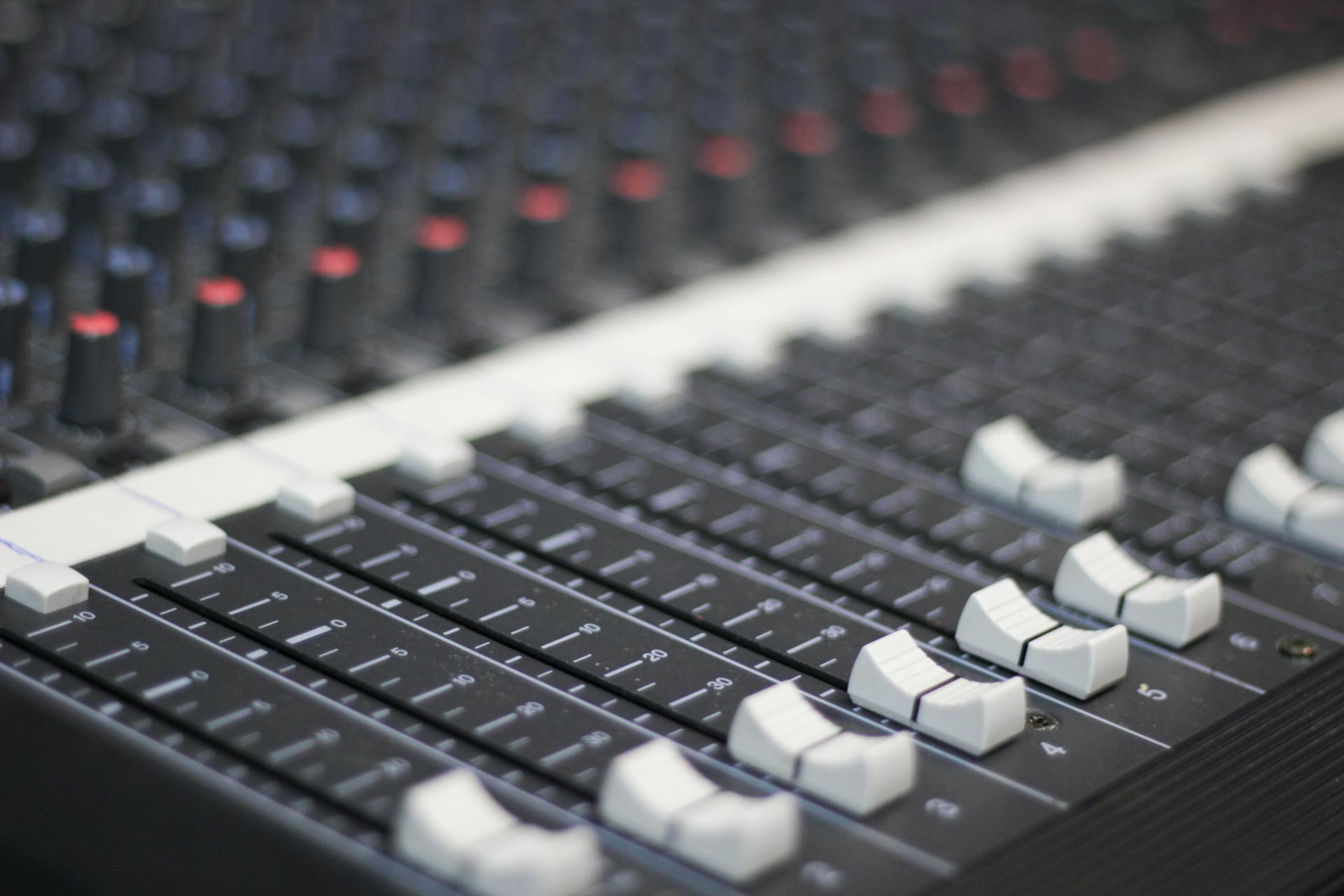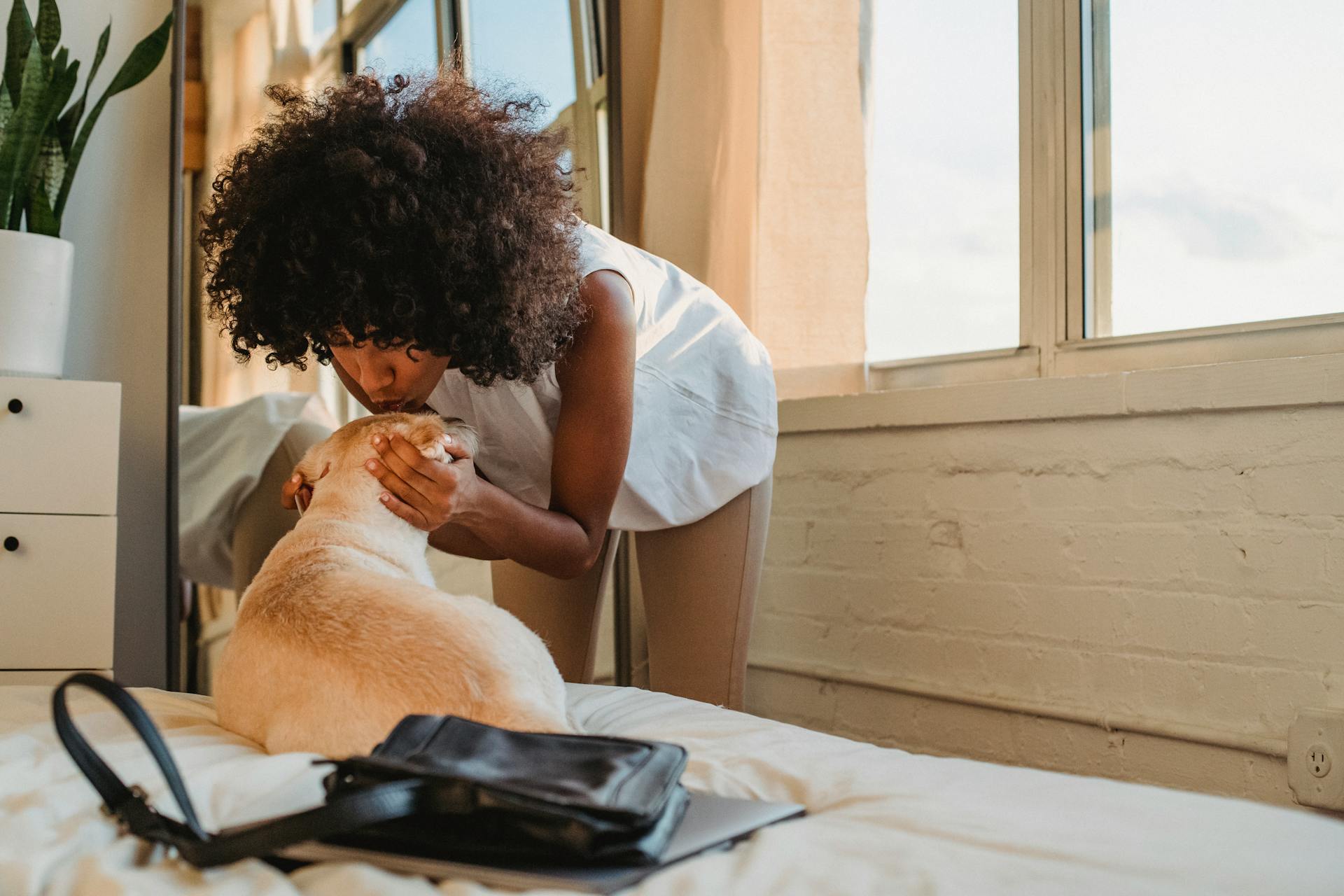
The Pointer Pitbull Lab Mix is a unique and exciting breed that requires careful consideration and attention to its specific needs. This breed can thrive in active households with plenty of exercise and mental stimulation.
Their high energy levels make them a great fit for families who enjoy outdoor activities, such as hiking or running. With a combination of Pointer, Pitbull, and Lab traits, they can be a great companion for those who want a loyal and loving friend.
To ensure the best possible life for your Pointer Pitbull Lab Mix, it's essential to understand their grooming needs. Regular brushing can help prevent matting and tangling of their coat, which is a mix of the Pointer's short coat and the Lab's medium-length coat.
Appearance and Care
The Pointer Pitbull Lab mix is a unique blend of characteristics, and their appearance is no exception. They can resemble one parent more closely, or have a mix of both parents' features.
Their athletic and graceful appearance is a result of their Pointer heritage, which can make them stand between 23 and 28 inches tall and weigh around 45 to 75 pounds.
Their coat can be various colors, with or without markings, and they have floppy ears.
To care for your Pointer Pitbull Lab mix, you'll need to fulfill their basic needs like food, water, grooming, and exercise.
They will also need to know that you truly care for them by showering them with love and affection.
Training Your
Training your Pointer Pitbull Lab mix requires patience, consistency, and positive reinforcement. These intelligent dogs can be stubborn, so it's essential to start training early and use firm, consistent commands and rewards.
They'll need ample opportunities for socialization, which will help them become confident and well-adjusted adult dogs. This breed mix will inherit characteristics from both parent breeds, so be prepared for a unique combination of traits.
To avoid punishment-based training, which can backfire, focus on rewards-based training instead. This approach is highly effective and will help your dog learn quickly and develop a strong bond with you.
Here are some essential training areas to focus on:
- General puppy training
- Crate training
- Potty-training
Remember, a Pointer Pitbull Lab mix needs a lot of quality exercise per day to stay happy and healthy. Aim for 30 to 60 minutes of walking, divided into two sessions, and provide plenty of attention to prevent separation anxiety and destructive behavior.
Puppies
A Pointer Pitbull Lab mix is a relatively low-maintenance breed when it comes to grooming, requiring only weekly brushing to stay in great condition.
They are very energetic puppies who need early socialization and training.
Their short coats are easy to maintain, but be sure to check their eyes and ears weekly to prevent infection.
Daily teeth-cleaning is essential to maintain oral health.
Trim their nails every few weeks to keep them looking their best.
Choose high-quality dog food suitable for their age and activity level to prevent overfeeding and weight gain.
Pet Ownership
As a responsible pet owner, it's essential to consider the needs of a Pointer Pitbull Lab mix. They require significant levels of training, especially due to their stubborn streak.
Their exercise needs are also substantial, and if left alone too long, they may display separation anxiety and engage in destructive behaviors. This means you'll need to invest time and effort into regular exercise and mental stimulation.
A well-trained Pointer Pitbull Lab mix can be a loving and loyal companion, responding well to firm training and consistent use of rewards. They're also relatively easy to train, making them a great choice for experienced owners.
Designer Dog Controversy
The 'Designer Dog' Controversy is a topic of debate among pet owners and breeders. Purebred dogs are often more predictable in terms of physical appearance and temperament.
However, research suggests that purebred dogs face a greater risk of hereditary conditions. This is because limited gene-pools and inbreeding lead to a prevalence of similar genetic material.
Mixed-breed dogs, also known as 'designer' dogs, have more varied genetic material. This means they may be less prone to breed-specific inherited disorders.
Responsible breeding can reduce breed-specific genetic problems in purebred dogs. But, it's essential to find reputable and trustworthy breeders, regardless of whether you're seeking a purebred or a mixed-breed dog.
Pet Ownership: Pros and Cons
Pet ownership requires a lot of responsibility and commitment. A strong and powerful dog like a Pointer Pit Bull mix needs significant levels of training.
They require a great deal of quality exercise, which can be beneficial for their physical and mental health. If left alone too long, they may display separation anxiety and engage in destructive behaviors.
Investing in comprehensive pet insurance is crucial due to potential health issues that may require ongoing treatment or surgery. A Pointer Pit Bull mix can be a loving and loyal companion, but they need firm training and consistent use of rewards.
Low maintenance in terms of grooming is a bonus for busy pet owners, requiring little more than a weekly once-over with a brush to remain in good condition.
Children and Pets
If you're considering bringing a Lab Pointer into your family, you'll be happy to know that they get along great with kids. They'll form strong bonds and become playmates, but it's essential to remember that early training and socialization is crucial.
Early socialization really pays off with this mixed breed. Make sure to reward your Lab Pointer for good behavior and adhere to a proper training regimen when you bring them home to your family. This will help them learn to interact with children in a safe and respectful way.
Lab Pointers are intelligent and easy to train, which makes them a great addition to families with kids. However, it's still important to supervise playtime between kids and dogs to ensure neither party accidentally harms the other.
The breed's high prey drive can be an issue with smaller household pets, so be sure to introduce your Lab Pointer to any other pets properly and set boundaries right from the start. This will help prevent any potential problems down the line.
Health and Nutrition
Lab Pointers are generally healthy dogs, but like any breed, they can be predisposed to certain health issues. Regular wellness visits with your vet are crucial to catch any potential problems early.
Some common health problems Lab Pointers face include obesity, skin problems, and hip and elbow dysplasia.
Lab Pointers need to stick to a healthy diet, as overeating can cause weight gain and associated health problems, especially if adequate exercise isn’t offered.
A high-quality dog food formulated for a medium-sized breed with high energy is ideal for Lab Pointers. You should also look at the ingredient list to ensure it doesn’t contain any food allergens.
Lab Pointers require three cups of dry food per day once they reach around 3 months old. It's essential to set a strict feeding schedule to ensure they get the proper amount of food at the right time.
Here are some recommended diagnostic tests to monitor your Lab Pointer's health:
- X-ray imaging
- Blood Analysis
- Optical Examination
- Orthopedic
- Regular Full Physical Examination By Veterinarian
Food and Diet
Lab Pointers require a balanced diet to stay healthy. A high-quality dog food that's suitable for their age is a must.
To prevent obesity, it's essential to monitor their food intake. Lab Pointers need 2 to 2.5 cups of high-quality dog food per day as adults. This can be divided into morning and evening feeding.
A healthy diet is crucial to prevent weight gain and associated health problems. Overeating can lead to health issues, especially if they're not getting enough exercise.
Lab Pointers need to stick to a healthy diet, and their dietary needs change as they grow from puppyhood to adulthood and into their senior years. Regular check-ups with a veterinarian can provide personalized recommendations for their diet.
Here's a rough guide to their daily food intake:
It's also essential to keep them hydrated by filling their water bowl every day. Replacing fatty treats with vegetables can help prevent weight gain and promote a healthy lifestyle.
Health Needs

Lab Pointers are generally a healthy breed, but like any mixed breed, they can be prone to some inherited health issues. It's essential to be aware of these potential problems to give your Lab Pointer the best care possible.
Regular wellness visits with your vet are crucial to catch any health issues early on. This will help prevent or manage conditions that can arise.
Some common health problems Lab Pointers may face include obesity, skin problems, and hip and elbow dysplasia. These conditions can be managed with a healthy diet and regular exercise.
Lab Pointers are also susceptible to ear infections, which can be painful and uncomfortable for your dog. Regular ear cleaning and inspections can help prevent these issues.
Certain health tests can help identify potential problems in your Lab Pointer. These may include X-ray imaging, blood analysis, and optical examination.
Here are some potential health issues to watch out for in your Lab Pointer:
- Cold Tail
- Ear Infections
- Joint Dysplasia
- Allergies
- Skin Issues
- Cysts
- Elbow Dysplasia
- Canine Hip Dysplasia (Chd)
- Retinal Dysplasia
Remember, every dog is different, and your Lab Pointer's dietary needs will change throughout their life. Consult with your veterinarian to determine the best diet for your dog based on their age, weight, and energy level.
Grooming and Maintenance
These dogs are generally low-maintenance when it comes to grooming, but regular care is still necessary to keep them clean and healthy.
Weekly ear cleaning is crucial, especially since Pointer Pits are prone to ear infections due to their floppy ears. Regular ear examinations and cleaning are a must.
To maintain their oral hygiene, daily toothbrushing is needed, and dental chews can be beneficial if your dog doesn't respond well to brushing.
Pitbull Shedding
Pointer Pits are moderate shedders, consistently shedding the same amount of fur all year round.
Regular brushing is essential to reduce the frequency of shedding, making it a crucial part of their grooming routine.
With their single coats and short hair, they don't require frequent bathing, but regular nail trimming and ear cleaning are still necessary.
By incorporating a regular brushing routine, you can keep your Pointer Pit's coat looking its best and reduce the amount of loose hair around the house.
Breed Maintenance
The Lab-Pointer is considered a low-maintenance breed that requires very little when it comes to grooming.
Weekly brushing is enough to maintain their short coats, but if your dog stays outside frequently, a bath at least once a week is a good idea.
Their nails should be trimmed at least once every few weeks to prevent overgrowth.
Daily toothbrushing is necessary to maintain their oral hygiene.
You should also trim their nails if not worn out through activity.
Lab Pointers often suffer from elbow dysplasia, so regular check-ups with your vet are crucial.
Regular ear examinations and cleaning are also important to prevent infections.
Bathing should only be done when the animal is truly dirty.
A regular brushing routine can reduce the frequency of shedding, but Pointer Pits are still moderate shedders and will consistently shed the same amount of fur all year round.
Secure pet health insurance today to avoid high veterinary care costs, especially for conditions like elbow dysplasia.
Exercise
Pointer Pitbull Lab mixes need a lot of quality exercise per day, typically 30 to 60 minutes of walking divided into two sessions.
They're intelligent dogs that respond well to firm training by using positive reinforcement, but they can also have a stubborn streak.
To avoid weight gain and boredom, long walks and playtime throughout the day are essential. This will help keep them stimulated and prevent destructive behavior like gnawing.
If you don't give them enough attention, they can develop separation anxiety. So, be sure to give them plenty of attention and interaction.
Regular exercise and playtime will help keep them happy and healthy.
Costs and Considerations
The cost of owning a pointer pitbull lab mix can be a significant consideration. The average price range for this designer breed is $800 to $1,800 for a puppy.
You'll also need to factor in adoption fees, which typically cost between $300 and $500 if you choose to adopt from a rescue organization.
Here's an interesting read: Pitbull Lab Mix Cost
The initial cost of owning a pointer pitbull lab mix can add up quickly. According to estimates, the total initial cost is around $280.
Here's a breakdown of the estimated costs:
You can lower these expenses by buying dog food in bulk or making your own toys.
Owner Experiences
As a Lab-Pointer Pitbull mix owner, you're likely to encounter some unique challenges.
Training a new puppy can be a daunting task, especially if you're new to dog ownership. Some owners have reported issues with training their new puppy, so it's essential to be patient and consistent.
Lab-Pointer Pitbull mixes are known for their high energy levels, so they require regular exercise to keep them happy and healthy.
Frequently Asked Questions
Is a Pointer Lab mix a good dog?
A Pointer Lab mix can be a great fit for first-time owners due to its intelligence and ease of training. With proper care and attention, this energetic breed can thrive as a loving companion.
How big do Pointer pitbull mix get?
Pointer pitbull mixes typically weigh between 30-75 pounds and stand 17-28 inches tall at full growth. Their size can vary, but they generally fall within this medium to large breed range.
What is a Lab and Pointer mix called?
A Lab and Pointer mix is commonly known as a Lab Pointer or Pointerdor. You can find these lovable mixed breed dogs waiting for adoption in shelters and rescues.
Are pitbull Lab mixes good dogs?
Yes, Pitbull Lab mixes are known for being friendly, highly trainable, and great with kids, making them an excellent family pet. They are eager to please and quick to learn, making them a wonderful addition to many families.
Featured Images: pexels.com


